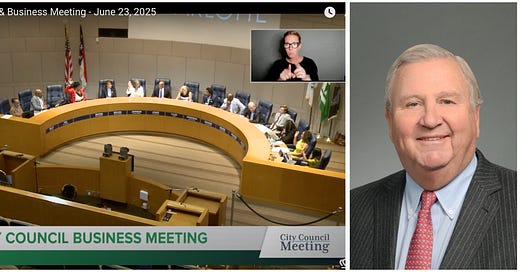Developer Johnny Harris calls out 'performative activism' of City Council
Harris warns of a 'troubling shift' in the council's approach to policy decisions
The following article appeared in the June 27, 2025, edition of The Charlotte Ledger, an e-newsletter with smart and original local news for Charlotte. We offer free and paid subscription plans. More info here.
Johnny Harris says the Charlotte City Council is ‘increasingly driven by performative activism’; says close vote on airport contractors signals ‘troubling shift’
The Charlotte City Council voted Monday on a proposal to look into raising wages of airport contract workers (left). Businessman Johnny Harris says that’s troubling (right).
Earlier this week, The Ledger published excerpts of an article from The Assembly, which quoted several prominent political and business leaders expressing concern about the direction of the Charlotte City Council.
On Wednesday, we heard from another prominent Charlottean who wanted to join the growing chorus of leaders expressing exasperation with the City Council: businessman Johnny Harris.
Harris is one of the city’s best-known real estate developers, who developed large parts of SouthPark and Ballantyne and who lured the PGA Tour here for the annual golf tournament at Quail Hollow Club, where he is the president — among many other Charlotte leadership roles. He’s not known as a wide-eyed partisan, and over the decades, he has generally been in tune with the city’s business-political leadership and has championed the city’s growth.
In a column written for The Ledger, Harris said he was dismayed by a close City Council vote this week — one that could have placed the city on the course of requiring contractors of American Airlines, the biggest tenant of the city’s airport, to pay higher wages.
Proponents said the city should take steps to improve the lives of workers, while opponents questioned whether city has authority to enact such a rule and what it might mean for the future of the airport, a major economic engine. The council deadlocked 5-5, and Mayor Vi Lyles cast the deciding vote to reject the idea.
In his column for The Ledger, Harris says the close vote signals a “troubling shift” away from the spirit of public-private cooperation in Charlotte, and that “this vote reflects a Council increasingly driven by performative activism.”
He continued:
Keep reading with a 7-day free trial
Subscribe to The Charlotte Ledger to keep reading this post and get 7 days of free access to the full post archives.



